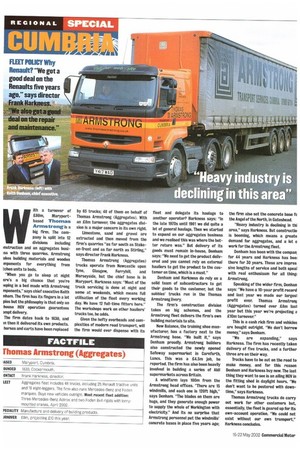IN ith a turnover of £80m, Maryportbased Thomas Armstrong is a big firm. The company is split into 12
Page 46

If you've noticed an error in this article please click here to report it so we can fix it.
divisions including instruction and an aggregates busi:ss with three quarries. Armstrong akes building materials and wooden mponents for everything from tchen units to beds.
When you go to sleep at night ore's a big chance that you're ieping in a bed made with Armstrong mponents," says chief executive Keith nham. The firm has its fingers in a lot pies but the philosophy is that only an house HGY operation guarantees mpt delivery.
The firm dates back to 1830, and !ri then it delivered its own products. horses and carts have been replaced by 65 trucks; 48 of them on behalf of Thomas Armstrong (Aggregates). With an £8m turnover, the aggregates division is a major concern in its own right.
Limestone, sand and gravel are extracted and then moved from the firm's quarries "as far south as Stokeon-Trent and as far north as Stirling," says director Frank Harkness.
Thomas Armstrong (Aggregates) trucks operate from Newcastle upon Tyne, Glasgow, Ferryhill, and Merseyside, but the chief base is in Maryport. Harkness says: Most of the truck servicing is done at night and some at weekends, which means full utilisation of the fleet every working day. We have 12 full-time fitters here," The workshops work on other hauliers' trucks too, he adds.
Given the hefty overheads and complexities of modern road transport, will the firm would ever dispense with its
fleet and delegate its haulage to another operator? Harkness says: "In the late 1970s until 1981 we did quite a lot of general haulage. Then we started to expand on our aggregates business and we realised this was where the better return was." But delivery of its goods must remain in-house, Denham says: "We need to get the product delivered and you cannot rely on external hauliers to get the product to the customer on time, which is a must."
Denham and Harkness do rely on a solid team of subcontractors to get their goods to the customer, but the subbles' trucks run in the Thomas Armstrong livery.
The firm's construction division takes on big schemes, and the Armstrong fleet delivers the firm's own building materials to site.
New Balance, the training shoe manufacturer. has a factory next to the Armstrong base. "We built it," says Denham proudly. Armstrong builders also constructed the newly opened Safeway supermarket in Carnforth, Lancs. This was a £4.5m job, he reported. The firm has also been heavily involved in building a series of Aldi supermarkets across Britain.
A windfarm lays 100m from the Armstrong head offices. "There are 15 windmills, and each one is 120ft high," says Denham. "The blades on them are huge, and they generate enough power to supply the whole of Workington with electricity." And its no surprise that Armstrong personnel put the windmills' concrete bases in place five years ago; the firm also set the concrete base ft the Angel of the North, in Gateshead.
"Heavy industry is declining in thi area," says Harkness. But constructio is booming, which means a greate demand for aggregates, and a lot e work for the Armstrong fleet.
Denham has been with the compan, for 44 years and Harkness has beei there for 30 years. These are impres sive lengths of service and both speal with real enthusiasm for all thing: Armstrong.
Speaking of the wider firm, Denhan says: "We have a 10-year profit record and last year we made our largest profit ever. Thomas Armstrong (Aggregates) turned over £8m Iasi year but this year we're projecting a 110m turnover."
This is a cash rich firm and vehicles are bought outright. "We don't borrow money," says Denham.
"We are expanding," says Harkness. The firm has recently taken delivery of five trucks, and a further three are on their way.
Trucks have to be out on the road to make money, and for this reason Denham and Harkness buy new. The last thing they want to see is an ailing HGY in the fitting shed in daylight hours. "We don't want to be pestered with downtime," says Harkness.
Thomas Armstrong trucks do carry out work for other customers but, essentially, the fleet is geared up for its own-account operation. "We could not exist without our own transport," Harkness concludes.




























































































































































